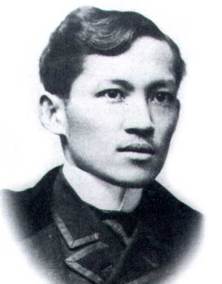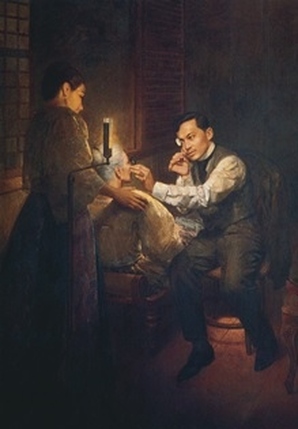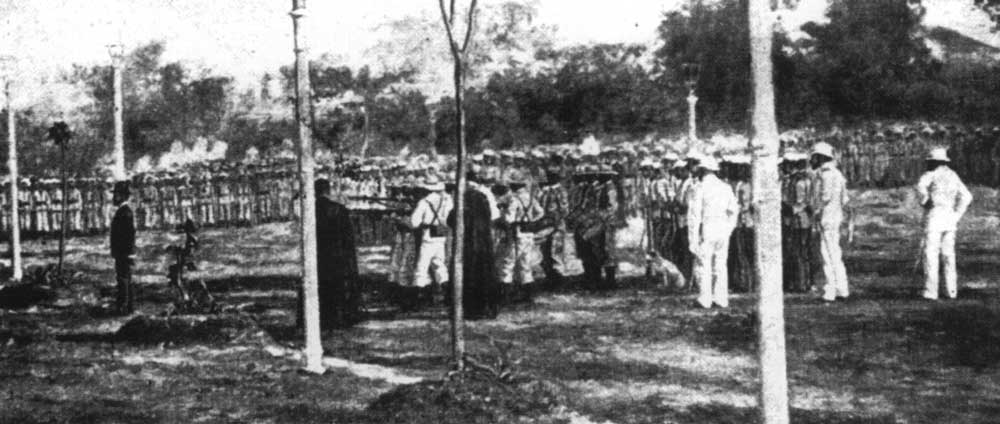|
It seems a fitting week to write about a man taking a stand against oppression, about the kind of courage that refuses to back down from the powers of violence and injustice. We had a lovely guest for Thanksgiving dinner, a young woman from the Philippine Islands. I asked her what holidays she celebrated in that country, and she told me about National Hero Day, December 30th. The day honors José Rizal, a man so at peace with himself and circumstances that he faced his execution without a hitch in his heartbeat. (Click to tweet) That's what the doctor said who checked Rizal's pulse as he faced the firing squad in 1896.  José was born and grew up Laguna, a farming community in the Philippines. His intelligence became apparent early and his family gave him the best education available. He decided study ophthalmology after his mother began to lose her eyesight. But due to discrimination against native Filipinos, Rizal was forced to leave his studies at Manila's Santo Tomas University. (American nurses were held at Santo Tomas when the Japanese made it a prison camp during WWII.) At 21, Jose caught a ship to Spain and enrolled in the Universidad Central de Madrid to finish is medical degree. He earned a second doctorate at the University of Paris and a third in Germany. He excelled at whatever he put his mind to, including art, poetry, science, philosophy and architecture. Some say he spoke ten languages, others say the number is 22. José Rizal became a prolific writer and blistering critic of Spanish colonialism, laying bare the cruelties inflicted on native Filipinos by Spanish and Church authorities. His books sparked fury and fear around the world among powerful elites with a vested interest in colonialism. In the Philippines, his books proved a catalyst for revolution. In 1892, Rizal had returned to the Philippines and formed a group to work for reform through peaceful and legal means. He believed, that united, Filipinos could protect themselves from violence and injustice and gain freedom from Spanish oppression.  Using nonviolent protest more than 25-years before Mahatma Gandhi led his campaign of civil disobedience against the British Empire, Rizal led tenants to protest ever-increasing rents, evictions, and the destruction of Filipino farms. His dauntless courage and his hope for Filipino freedom threatened the status quo. He was soon declared an enemy of the state, arrested and imprisoned. Without benefit of a trial, authorities deported Rizal to a remote town on the Philippine Island of Mindanao. Dr Rizal Treating His Own Mother, Romeo Enriquez, 1960. Courtesy of the National Historical Institute, Manila, the Philippines “…our liberty will (not) be secured at the sword’s point…we must secure it by making ourselves worthy of it. And when a people reaches that height God will provide a weapon, the idols will be shattered, tyranny will crumble like a house of cards and liberty will shine out like the first dawn” – José Rizal Exile did not dampen Rizal’s fervor. In his four years of banishment, he built a school for boys, a hospital, water supply system and invented a machine for making bricks. He practiced medicine and scientific study, continued his artistic and literary works, farmed and kept up a wide correspondence with family and colleagues around the world. In 1896, after Rizal was allowed to return to Manila, Filipino liberationists revolted against the Spanish. Though he was not involved, Rizal was arrested, charged with sedition, conspiracy and rebellion. He was sentence to death with no chance to face is accusers or defend himself. Dr. Jose Rizal was executed by a firing squad, December 30, 1896. He was 35. The Filipino revolution against Spain never fully succeeded, and when the United States won the Spanish American War, Rizal’s native land became a possession of the U.S. A year later Filipinos tried again for independence, the First Philippine Republic declaring war on the U.S.A. The effort was short-lived. But later the U.S. Congress passed legislation forming a democratic government in the Philippines. One of Jose Rizal’s poems was read as evidence that Filipinos were not barbarians unable to govern themselves. Rizal penned My Last Farewell just hours before he faced the firing squad. "It is a useless life that is not consecrated to a great ideal. It is like a stone wasted on the field without becoming a part of any edifice." We need more heroes and heroines with courage like this. (Click to Tweet)
Am I a stone wasted on the field without becoming part of any edifice? Are you? Comments are closed.
|
I'm fascinated to discover little-known history, stories of people and events that provide a new perspective on why and how things happened, new voices that haven't been heard, insight into how the past brought us here today, and how it might guide us to a better future.
I also post here about my books and feature other authors and their books on compelling and important historical topics. Occasionally, I share what makes me happy, pictures of my garden, recipes I've made, events I've attended, people I've met. I'm always happy to hear from readers in the blog comments, by email or social media. Archives
September 2023
Categories
All
|

